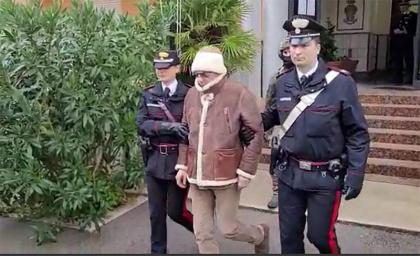Italian police on Monday caught one of the most notorious bosses of the Sicilian Mafia, Matteo Messina Denaro, a ruthless operator who had been on the run for 30 years.
The 60-year-old was arrested after visiting a health clinic in the Sicilian capital Palermo where he was being treated, and surrendered without putting up a fight, officials said.
Messina Denaro, who once reportedly boasted he could “fill a cemetery” with his victims, had been a leading figure in Cosa Nostra, the real-life Sicilian crime syndicate depicted in the Godfather movies.
Italian Prime Minister Giorgia Meloni flew to Palermo to congratulate officials in person for what she said was a “major blow for organised crime”.
The mobster, who had been on the run since 1993, was believed to have been undergoing periodic treatment for colon cancer and was using a false ID.
Prosecutors said he was not armed when he was arrested and appeared in good health, dressed well with luxury accessories including watch officials valued at up to 35,000 euros.
Messina Denaro was one of the mob’s most brutal bosses, whose convictions included a life sentence given in absentia in 2020 for the 1992 murder of anti-mafia judge Giovanni Falcone.
Chief prosecutor Maurizio De Lucia confirmed that despite his fugitive status, he had been an “operative boss”, with “contacts and economic resources”.
But he warned that the Cosa Nostra, which in recent years has been eclipsed by the rival ‘Ndrangheta mafia, “has never been the exclusive property of Messina Denaro”.
“Obviously the mafia is not defeated, and the biggest mistake to make would be to think that the game is over,” he said.
“Because the game is not over.”
– Mafia myth –
Monday’s press conference was briefly interrupted by a father asking prosecutors whether he might now see justice for his son, a mafia victim.
“We will not stop, we will do everything to get to the truth,” De Lucia replied.
Messina Denaro had been number one on Italy’s most-wanted list, accused of mafia association, multiple murders and use of explosives.
Among other crimes, he was convicted in absentia of being behind the 1993 bombings in Rome, Milan and Florence that killed 10 people.
He was also convicted for the murder of a teenager who was strangled and dissolved in acid after his father turned state witness.
Anna Sergi, a criminologist at the University of Essex, said Messina Denaro’s importance was as “the last one, the most resilient one, the ‘purest’ Sicilian mafioso remaining”.
“He is the essence of the great historical power of Cosa Nostra. The myths around his period on the run are part of the reason why the Mafia myth endures.”
She said little was known about where he had been or how he stayed hidden, but noted: “A man among the most wanted in the world must have had protection.”
– Crucial battle –
After being arrested, Messina Denaro was escorted by officers to a waiting vehicle, wearing a hat and a brown leather jacket with a cream sheepskin lining, according to police images.
His first words to officers were “I’m Matteo Messina Denaro”, ANSA reported.
Locals cheered and applauded in the rain as he was driven away from the Palermo clinic by police, according to police videos.
“For me today represents the end, the end of Cosa Nostra,” said Palermo resident Giovanni Guarino.
“The old mass murder mafia that brought down this country (is over).”
Prosecutors declined to give details on how he had been living for the past three decades, saying only that their investigation into his whereabouts gained pace in recent days.
They had information of someone matching his description who had booked an appointment at the clinic in Palermo, but it was only on Monday morning that his identity was confirmed.
Prosecutors said wiretaps had been crucial in their inquiries.
– In the territory –
Investigators had spent decades searching the homes and businesses of his known allies in Sicily, including for grottos, caverns, or even bunkers inside buildings where he could be concealed.
In 2015, police discovered he was communicating with his closest collaborators via the pizzini system, where tiny, folded paper notes were left under a rock at a farm.
Federico Varese, a criminology professor at Oxford University, said the fact that Sicilian mob families are weaker these days than their counterparts in Calabria or Campania may have helped in his capture.
He said it was “amazing that he was still in Palermo”.
“But it makes sense. If you want to continue to exercise a degree of power, you must be in the territory,” he said.








